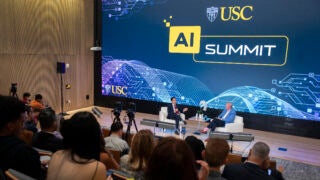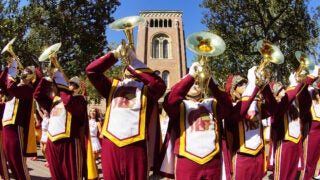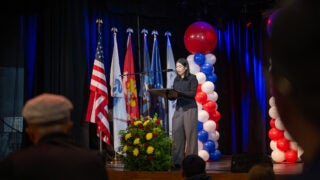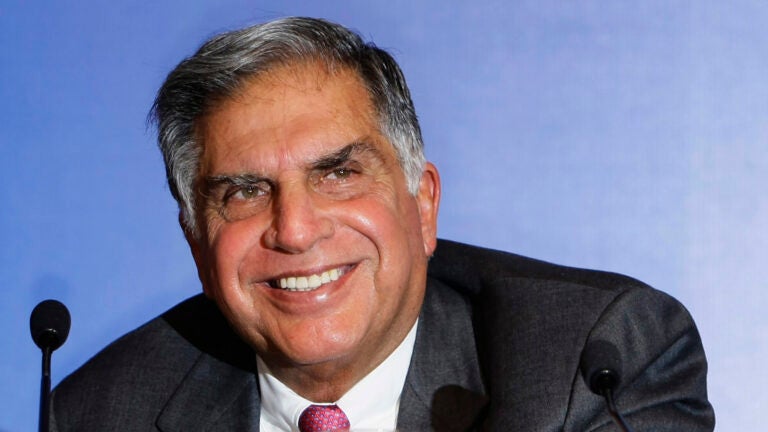
In addition to leading the Tata Group, Ratan N. Tata also chaired Tata Trusts, the philanthropic focused on community development in health care, education, water quality, urban poverty, energy, and arts and culture. (Photo/Gautam Singh, The Associated Press)
In memoriam: USC Life Trustee Ratan N. Tata, industrialist and philanthropist, 86
The investor and businessman oversaw the India-based multinational conglomerate Tata Group for decades.
USC Life Trustee Ratan N. Tata, who deftly oversaw the India-based multinational conglomerate Tata Group for decades, died on Oct. 9 in Mumbai. He was 86.
Tata was chairman of Tata Sons, the holding company of the Tata Group, from 1991 to 2012. Upon his retirement, he was named chairman emeritus, allowing him to maintain an influence over the major Tata companies, including Tata Industries, Tata Motors, Tata Steel and Tata Chemicals.
As the largest Indian multinational conglomerate, the Tata Group operates in more than 100 countries on six continents. It features India’s largest private steel company, information technology outsourcing firm and auto manufacturer. During Tata’s tenure, its annual revenues surpassed the $100 billion mark.
Tata also chaired Tata Trusts, the philanthropic arm of the business enterprise that focused on community development in the areas of health care, education, water quality, urban poverty, energy, and arts and culture.
His connection with USC formed when he became a patient of Tom DeMeester, professor emeritus and former chair of the department of surgery at the Keck School of Medicine of USC, some two decades ago. Tata joined the USC Board of Trustees in 2005.
“It is with profound sadness that we mourn the passing of Mr. Ratan Tata, a cherished friend and esteemed USC Life Trustee,” USC President Carol Folt said. “His departure leaves an irreplaceable void in our hearts and the fabric of the communities here and throughout India, he so selflessly served.”
“Mr. Tata was a visionary leader and dedicated philanthropist and was deeply admired by the Trojan Family for his warmth, wisdom and strategic counsel,” said Suzanne Nora Johnson, chair of the USC’s Board of Trustees. “His commitment to education as the best way to advance economic opportunity for all and his lifelong dedication to bridging cultures and nations will be missed by many in India and around the world.”
Ratan N. Tata: From India to Los Angeles and back
Tata was born in Mumbai, India, in 1937. He attended Campion School and Cathedral and John Connon School in Mumbai before enrolling at Cornell University. He earned a bachelor’s degree in architecture in 1962. After a brief stretch with architecture firm Jones and Emmons in Los Angeles, he returned to India in 1962 to join the family business.
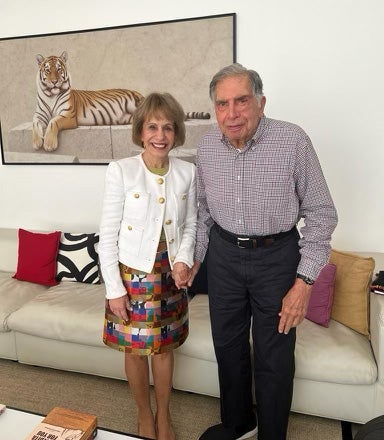
Assigned to the work floor at Tata Steel, Tata toiled alongside other blue-collar employees in the heat of the blast furnace. By 1971, however, he had risen to the corporate ranks as director-in-charge of National Radio & Electronics Co. He returned to the classroom in 1975, completing Harvard Business School’s Advanced Management Program.
In 1981, he became chairman of Tata Industries and the heir apparent to his uncle, Jehangir Ratanji Dadabhoy Tata, then chairman of the Tata Group. Tata’s strategic planning in the early 1980s helped Tata Industries shift its focus toward high-tech ventures.
He continued promoting technology businesses when he became group chairman in 1991, in addition to leading a series of acquisitions and mergers that broadened the conglomerate’s global footprint. Among Tata’s major successes were the acquisition of English tea company Tetley and English and Dutch steelmaker Corus.
Tata also spearheaded the launch of Tata Motors’ Indica, the country’s first fully domestic passenger car, in 1998. The vehicle proved a hit, selling about 1 million units before being discontinued in 2018.
Philanthropy a priority for Ratan N. Tata
Throughout his time at the helm of the Tata Group, Tata emphasized its longstanding values of integrity, ethics and philanthropy. In a rare appearance on Charlie Rose in 2012, the media-shy businessman explained that he recognized early in his career that charitable giving was a moral imperative.
“You cannot ignore the millions of people that sometimes struggle just to stay alive,” he said. “You need to do something — not to hand out doles, but to bring life back to them.”
The Tata Trusts hold two-thirds of Tata Sons stock and uses proceeds to support charitable and philanthropic work throughout India that seeks to alleviate poverty, support education and address various social ills.
Tata also held numerous leadership and advisory roles, including as a member of India’s Council on Trade and Industry, the president of the Court of the Indian Institute of Science and chairman of the Council of Management of the Tata Institute of Fundamental Research. He served on the board of directors of Alcoa and the international advisory boards of Mitsubishi, JP Morgan Chase and Rolls-Royce, among others.
In recognition of his many contributions, India’s government awarded Tata with its second-highest civilian honor, the Padma Vibhushan. He also received the Lifetime Achievement Award from the Rockefeller Foundation and was appointed Knight Grand Cross of the Most Excellent Order of the British Empire. Tata was named an honorary fellow of the Royal Academy of Engineering and the Institution of Mechanical Engineers, as well as a foreign associate of the National Academy of Engineering.
In January, Folt led a delegation of USC leaders to India as part of the university’s “USC-India Partner the Future” tour. “My very first visit was with Ratan Tata,” Folt recalled. “He absolutely loved USC and was so excited to hear our plans to supercharge our relationship with his beloved nation. His passion and vision for India’s future will remain in our hearts and minds.”

